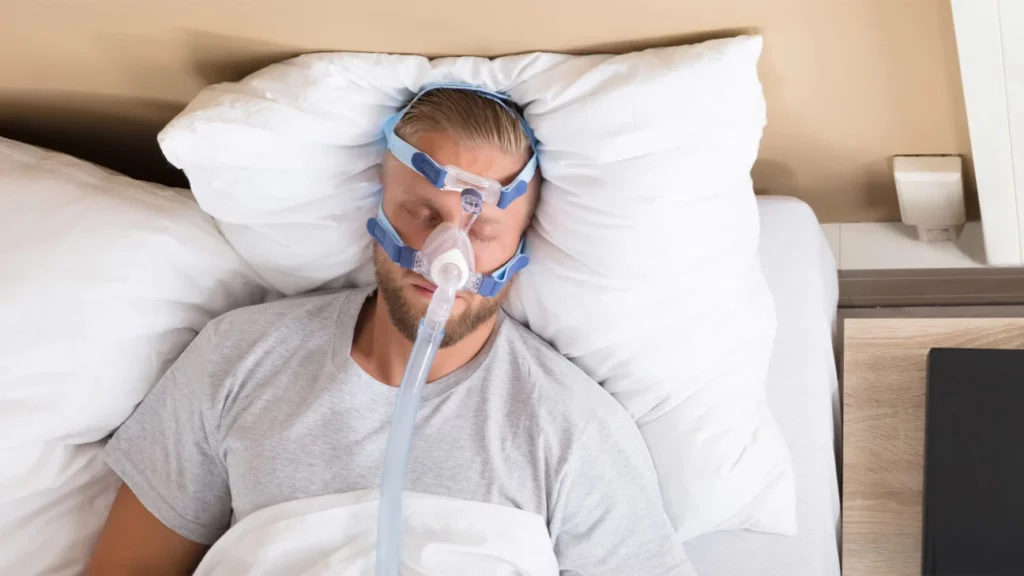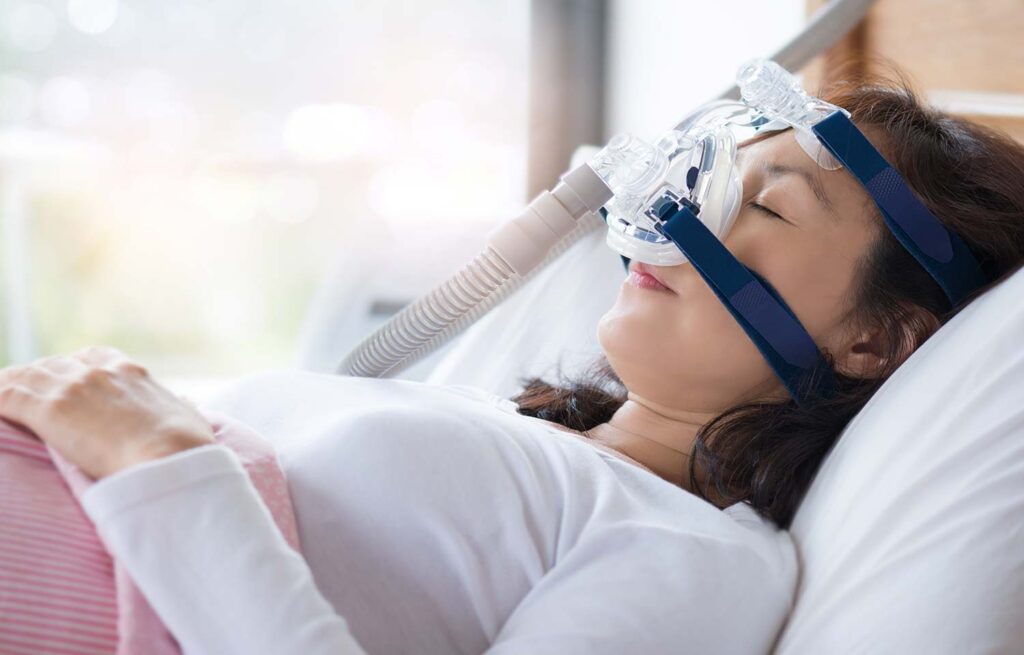Choosing the right Continuous Positive Airway Pressure (CPAP) machine can significantly impact the quality of sleep for individuals suffering from obstructive sleep apnoea (OSA). With a plethora of options available in the market, it can be overwhelming to identify which machine is the best fit. This article will guide you through the essential features to consider when selecting a CPAP machine, ensuring a restful night’s sleep.
Understanding CPAP Machines
Before delving into the specific features, it is crucial to understand what a CPAP machine does. These devices work by delivering a continuous stream of air through a mask, keeping the airways open during sleep. This prevents the pauses in breathing that characterise sleep apnoea, allowing for uninterrupted rest and improved overall health. Sleep apnoea, if left untreated, can lead to a myriad of health issues, including cardiovascular problems, daytime fatigue, and even cognitive decline. Thus, the importance of CPAP machines in managing this condition cannot be overstated.
Choosing the best CPAP machine involves careful consideration of various features, including pressure settings, comfort options, and advanced functionalities. Understanding personal needs and consulting with healthcare professionals can significantly enhance the selection process.
CPAP machines vary in design, functionality, and features. Therefore, it is essential to assess personal needs and preferences when selecting the most suitable device. Factors such as comfort, noise level, and portability should be considered, as these can significantly affect the user’s adherence to therapy. Additionally, many modern CPAP machines come equipped with advanced technology, such as Bluetooth connectivity and app integration, allowing users to track their sleep patterns and make necessary adjustments to their settings for optimal performance.

Types of CPAP Machines
There are several types of CPAP machines available, each catering to different needs:
- Standard CPAP: This is the most common type, providing a fixed pressure throughout the night.
- Auto-Adjusting CPAP (APAP): This type automatically adjusts the pressure based on the user’s needs, providing a tailored experience.
- Bilevel Positive Airway Pressure (BiPAP): This machine offers two different pressures for inhalation and exhalation, making it suitable for those who find it difficult to exhale against a continuous pressure.
In addition to these primary types, there are also specialised CPAP devices designed for specific conditions or preferences. For instance, some machines are equipped with humidifiers to add moisture to the air, which can alleviate dryness and irritation in the airways, a common complaint among users. Others may feature built-in sensors that monitor the user’s breathing patterns and adjust the pressure accordingly, ensuring maximum comfort and effectiveness throughout the night. Understanding these variations can empower users to make informed decisions about their treatment options, ultimately leading to a better quality of sleep and overall wellbeing.
Key Features to Look For
When evaluating CPAP machines, several key features can enhance the user experience. Understanding these features will help in making an informed decision.
Pressure Settings
One of the most critical aspects of a CPAP machine is its pressure settings. The device must deliver the correct pressure as prescribed by a healthcare professional. Machines with adjustable pressure settings, such as APAP, allow for a more comfortable experience, as they can respond to changes in breathing patterns throughout the night.
It is advisable to consult with a sleep specialist to determine the appropriate pressure settings before selecting a machine. This ensures that the device meets individual needs effectively.
Noise Level
The noise level of a CPAP machine can significantly affect sleep quality. Many modern machines are designed to operate quietly, with noise levels measured in decibels (dB). A machine that operates at 30 dB or lower is generally considered quiet and less likely to disturb sleep. Read more about disturb on https://spaces4learning.com/Articles/2020/05/25/Comfort-Is-Critical-for-Student-Success,-d-,-Here-Are-3-Simple-Factors-to-Consider.aspx
When testing machines, it is beneficial to listen to their operation in a quiet environment. This will help in selecting a device that promotes a peaceful sleeping atmosphere.
Portability
For frequent travellers or those who may need to use their CPAP machine away from home, portability is an essential feature. Lightweight and compact designs are ideal for travel, as they can easily fit into luggage without taking up too much space.
Some manufacturers offer travel-specific CPAP machines that come with a carrying case and are designed to operate on various power sources, making them versatile for different environments.

Comfort Features
Comfort is paramount when using a CPAP machine, as it directly influences adherence to therapy. Several features can enhance comfort during use.
Mask Types
The type of mask used with a CPAP machine can greatly affect comfort levels. There are three main types of masks:
- Nasal Masks: These cover the nose and are suitable for those who breathe through their nose while sleeping.
- Full Face Masks: These cover both the nose and mouth, making them ideal for mouth breathers or individuals with nasal congestion.
- Nasal Pillows: These consist of small cushions that fit directly into the nostrils, providing a less obtrusive option.
Choosing the right mask type is essential for comfort and effectiveness. It is advisable to try different masks to find the best fit, as a poorly fitting mask can lead to air leaks and discomfort.
Humidification
Many CPAP machines come with built-in humidifiers or offer them as optional accessories. Humidification helps to prevent dryness in the airways, which can be a common issue for CPAP users. A humidifier adds moisture to the air, making it more comfortable to breathe, especially in dry environments.
Some machines feature heated humidifiers, which can further enhance comfort by providing warm, moist air. This feature is particularly beneficial during colder months or in arid climates.
Advanced Features
In addition to the essential features, many CPAP machines come equipped with advanced functionalities that can enhance the user experience.
Data Tracking and Connectivity
Modern CPAP machines often include data tracking capabilities, allowing users to monitor their therapy progress. This data can include information on usage hours, pressure levels, and events such as apnoeas or hypopnoeas. Click here to learn more about pressure.
Some devices offer Bluetooth connectivity, enabling users to sync their data with a smartphone app. This feature can be particularly useful for tracking progress over time and sharing information with healthcare providers.
Smart Technology
Smart technology is becoming increasingly prevalent in CPAP machines. Some models feature automatic adjustments based on detected breathing patterns, ensuring optimal therapy throughout the night. This technology can enhance comfort and improve overall treatment efficacy.
Additionally, some machines come with built-in reminders for maintenance and mask replacement, helping users stay compliant with their therapy.
Consultation and Recommendations
While understanding the features of CPAP machines is essential, consulting with a healthcare professional is equally important. A sleep specialist can provide personalised recommendations based on individual needs and health conditions.
It is advisable to undergo a sleep study to determine the severity of sleep apnoea and the appropriate pressure settings for therapy. This information will guide the selection of the most suitable CPAP machine.
Trial Periods
Many suppliers offer trial periods for CPAP machines, allowing users to test the device before making a final commitment. This can be an excellent opportunity to assess comfort, noise levels, and overall effectiveness in a real-world setting.
Taking advantage of trial periods can lead to a more satisfactory choice, as it provides the chance to experience the machine’s features firsthand.
Maintenance and Care
Proper maintenance of a CPAP machine is crucial for ensuring its longevity and effectiveness. Regular cleaning and care can prevent the build-up of bacteria and ensure optimal performance.
Cleaning Regimen
It is recommended to clean the mask, tubing, and water chamber regularly. Most manufacturers provide guidelines on how to clean their devices effectively. Typically, a mild soap and warm water solution is sufficient for cleaning components.
Additionally, replacing filters and other consumable parts as advised by the manufacturer is essential for maintaining the machine’s performance.
Storage and Transport
When not in use, CPAP machines should be stored in a cool, dry place to prevent damage. For travel, using a protective case can safeguard the device from impacts and environmental factors.
Ensuring that the machine is transported safely will prolong its lifespan and maintain its functionality.
Conclusion
By prioritising comfort and effectiveness, individuals can improve their adherence to therapy, leading to better sleep quality and overall health. With the right CPAP machine, restful nights and rejuvenated mornings are within reach.

